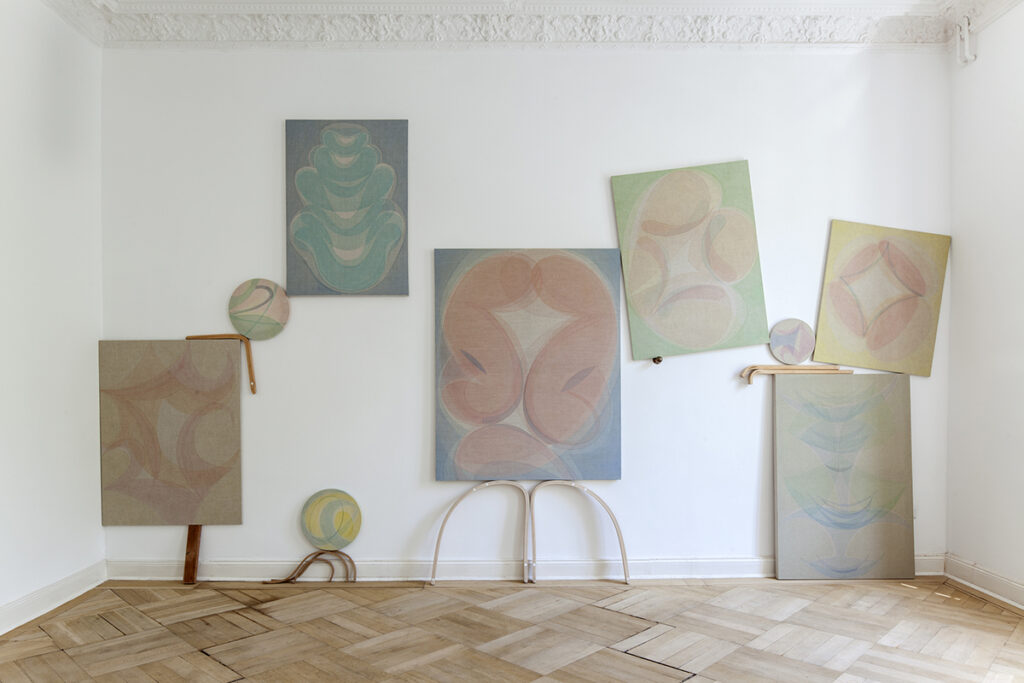Yelena Popova
Unnamed
April 28 – June 30, 2012

Wir freuen uns, mit Unnamed Yelena Popovas erste Einzelausstellung im Rahmen des Gallery Weekends am 27. April 2012 um 18 Uhr zu eröffnen. In ihren Filmen, Gemälden und Zeichnungen setzt sich die russisch-britische Künstlerin mit der geheim gehaltenen radioaktiven Kontamination ihrer Heimatstadt auseinander.
Der zweiteilige filmische Essay Unnamed kombiniert Popovas Erinnerungen, politische Geschichte und poetische Reflexionen über das schwierige Erbe des Kalten Krieges. Anhand historischen Filmmaterials, verwackelter Amateurvideos und vor Ort gedrehter Straßenszenen erzählt die Künstlerin die Geschichte ihrer Heimatstadt im Ural. Die im Jahre 1945 gegründete Stadt war ein geheimes Zentrum sowjetischer Nuklearforschung und bereits 1957 ereignete sich hier eine nukleare Katastrophe, die lange verdunkelt wurde. Im zweiten, nostalgischeren Teil von Unnamed stellt Popova Analogien zwischen der Stadt, in der sie aufgewachsen ist, und einer estnischen Stadt her und erkennt in beiden ein hohes utopisches Potenzial: trotz zahlreicher der Geheimhaltung geschuldeten Einschränkungen, wie einer besonderen Reisebeschränkung, genossen die Einwohner beider Städte auch zahlreiche Vorteile, als lebten sie in einem isolierten sowjetischen Paradies.
Der Westen wurde erst 20 Jahre später aufgrund einer Publikation des sowjetischen Biologen Zhores Medvedev auf die Nuklearkatastrophe aufmerksam. Medvedev präsentierte darin seine Forschungsergebnisse bezüglich der Auswirkungen radioaktiver Strahlungen auf Säugetiere und Vögel im Katastrophengebiet.
Die nicht wahrnehmbare Kontamination macht Popova in Mutatis Mutandis (Aus dem Lateinischen: Nach Änderung des zu Ändernden), einer Serie von Vogelzeichnungen, sichtbar, indem sie den Vogelzeichnungen in einem ornithologischen Bestimmungsbuch Verformungen und Mutationen hinzufügt.
Im zweiten Galerieraum zeigt Popova eine Installation von Gemälden, in der sie ihre filmische Untersuchung des Dualismus zwischen der Macht des Unsichtbaren und der Ohnmacht des Materiellen auf eine formalistische Ebene verschiebt. Stilistisch scheinen die Malereien der Serie Untitled tief in der konstruktivistischen Tradition verwurzelt. Doch die Formen, die Popova mit stark verdünnten, dennoch leuchtenden Farben auf die Leinwand bannt, sind vornehmlich rund und organisch. So erinnern sie eher an die dekonstruktivistische Architektur des 21. Jahrhunderts als an den modernistischen Ansatz im Russland nach der Revolution. In dem Popova mehrere Schichten durchscheinender Farbe auf Leinen aufträgt, schafft sie einen räumlichen, fast skulpturalen Effekt. Anhand von Rezepten aus alten Traktaten über Malerei gelingt es Popova Farben herzustellen, die die raue Oberfläche der Leinwand nicht überdecken, so dass die instabilen Kompositionen fast in den Hintergrund treten. Ihr Interesse an dem Bildträger als Objekt findet sich auch in den Installationen der Künstlerin wieder: In losen Gruppierungen sind ihre Gemälde auf den Boden gestellt, hängen schief aneinander lehnend an der Wand, gestützt von hölzernen Formen oder rostigen Messinggriffen.
Yelena Popova, 1978 geboren in Ozersk, ist Absolventin des Royal College of Art in London. Ihre Arbeiten wurden bzw. werden in der Londoner Saatchi Gallery, der Outpost Gallery in Norwich, der Zabludowicz Collection und der Red Mansion Foundation in London ausgestellt.
We are pleased to announce the opening of Unnamed, Yelena Popova’s first solo exhibition at the gallery on April 27, 2012 at 6 pm during Berlin’s Gallery Weekend. Popova’s project Unnamed is a very personal reflection on the secrecy of the cold war and the notion of opacity and transparency.
Secrecy and materiality, on the one hand, and the invisibility of the radioactive contamination on the other hand, are the main themes Popova investigates with her installations of paintings and drawings. In the cinematic essay in two parts – Unnamed – Popova combines autobiography, history and poetic reflection on uneasy heritage of the Cold War. By blending historical footage, blurry home videos and street scenes she recently recorded, Popova tells the story of her hometown in Urals, a secret settlement founded in 1945 and closely linked to the Soviet nuclear production and the nuclear disaster, which happened there in 1957. In the second, more nostalgic part of Unnamed, Popova draws analogies between the city where she grew up and an Estonian town attributing to them a high utopian potential: Despite severe travel restrictions, the inhabitants of both cities enjoyed many advantages during the cold war, as if they were living in an isolated Soviet paradise.
The West became aware of the nuclear catastrophy of 1957 only 20 years later through a book published by the Soviet biologist Zhores Medvedev, which presented a research on effects of radiation on mammals and birds in the area of Ural’s disaster. The following indiscernible contamination becomes visible in the series Mutatis Mutandis (from Latin: necessary changes had been made) of bird drawings that Popova created using the pages from a bird spotting book by adding deformations and mutations to the meticulously drawn ornithologic representations.
In the second exhibition space Yelena Popova shows an installation of paintings, in which she shifts the cinematografic examination of the dualism between the power of the unpresent and the debility of the present to a more formalistic level. Stylistically the painting series Untitled seems deeply rooted in constructivist sensibility. However, the forms Popova depicts with strongly diluted, still bright colors are mostly round and organic, reminding us more of the 21 century deconstructivist architecture than of the modernist approach in post revolutionary Russia. In adding several translucent layers of color on linen, Popova creates a spatial, even sculptural effect. With old recepies from historic painting books she is able to generate colors, which maintain the rough texture of the canvases present while the unstable compositions almost disappear. The interest in the frame as an object is continued in the way how the artist installs the painted canvases in groups, pointing out the gravity of the medium by placing them directly on the floor, mounting them by leaning one painting on the other, supported by little wooden forms or rusty handles.
Yelena Popova, born in Ozersk in 1978, graduated 2011 from the Royal College of Art in London. Her work was or will be shown in the Saatchi Gallery, London; the Outpost Gallery, Norwich; The Zabludowicz Collection, London; and the Red Mansion Foundation, London.